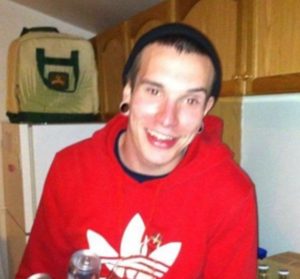 At 32, Bob Esque lives a life that once felt unimaginable. He’s a small business owner, a proud father, and is preparing to marry the love of his life.
At 32, Bob Esque lives a life that once felt unimaginable. He’s a small business owner, a proud father, and is preparing to marry the love of his life.
But behind his grounded, hopeful present lies a chaotic past filled with substance use, repeated incarcerations, and fractured relationships.
“I was willing to be anybody who wasn’t the old me,” Bob said. “As long as I didn’t become that guy again, I was all right.”
The Thirst of Adulthood
Bob’s story doesn’t begin in trauma. Raised in Chester County in what he described as a typical “functional” home, he saw alcohol as a symbol of adulthood.
“The men drank beer, the women drank wine,” he said. “That’s what we did.”
Eager to be seen as older and more mature, Bob had his first beer at age 11, handed to him by his father with a quiet “don’t tell your mother.”
That early exposure laid the groundwork for a long and dangerous relationship with alcohol. When he couldn’t get beer, he turned to marijuana. By his mid-teens, his substance use had deepened, and when he was around 15 or 16, his mother eventually kicked him out of their Chester County home. He spent about six months couch-surfing with friends, some whose parents turned a blind eye, others who normalized the behavior entirely.
“We’d skateboard, ride dirt bikes, play basketball, but eventually, all we did was drink,” he said. “Alcohol took over completely.”
At some point, though, Bob said he noticed that even the people he partied with were pulling away.
“Even some of my friends at the time, even they were pushing me away,” Bob said. “And I’m like, ‘Whoa. If he doesn’t even want anything to do with me, this has got to be pretty bad.'”
And yet, the chaos continued.
The Spiral from Teenager to Inmate
 His senior year of high school was marked by increasingly severe legal troubles, including marijuana possession charges and burglary. His first stint in Chester County Prison came during gym class, where officers came to his school, arrested him in front of everyone, and put him in handcuffs.
His senior year of high school was marked by increasingly severe legal troubles, including marijuana possession charges and burglary. His first stint in Chester County Prison came during gym class, where officers came to his school, arrested him in front of everyone, and put him in handcuffs.
“I was terrified,” Bob said of his first experience with jail. “I’m in there with adults. I had only turned 18 two months ago … and now I’m in there with guys who had been doing this forever. ”
He was fortunate, however. Prosecutors allowed him to enter Chester County’s drug court program. But after a year and a half, he hadn’t even gotten through the first three-month benchmark.
“I was hanging out with the same people, going to the same house parties,” Bob said.” I was sober, but not in recovery. I was still very much in the game.”
At one point, he found himself in a high school classroom wearing an alcohol monitor that buzzed during lessons. Still, he finished school and earned his diploma—one of the few bright spots during this early dark period.
The Breaking Point
Bob’s turning point came not with a single catastrophic event, but through a series of mounting realizations. One moment of self-awareness—when he realized he had more experience with incarceration than a man twice his age—marked a shift in how he viewed his life trajectory.
“I was 20 years old and in Chester County Prison for like the seventh or eighth time,” he said. “One day, there’s, like, this 45-year-old man who’s in there for the first time. You could tell he wasn’t made for prison. And there I am, calming him down, telling him what’s going to happen next. It was bizarre. That’s when I first realized, ‘This is my life.’”
By the time he returned for his ninth incarceration before age 23, Bob was unraveling. When he was released in early December, he was lost, friendless, and hopeless. On Christmas Eve, desperate to escape his addiction but unable to trust himself on the outside, he walked into the state police barracks and asked to be arrested.
“They looked at me and said, ‘Kid, go home. It’s Christmas Eve,’” Bob recalled. “I actually wanted to go to jail, and they wouldn’t take me.”
It was one of the lowest points of his life. Lost, alone, and hopeless, not even alcohol could help him anymore, he said.
“It was still giving me all the physical effects, but none of the relief,” Bob said. “My only solution to life had stopped working.”
Finally, his probation officer called him to tell him the warrant he had been asking for had been issued. On January 31, 2016, he turned himself in for what would turn out to be his last stretch in prison.
Those first few weeks in jail were his worst. He had given up alcohol, his substance of choice, and his abstinence only exacerbated the experience. He hallucinated, couldn’t differentiate dreams from reality, and trembled through withdrawal. As scary as it was, he was resolute and determined.
“Finally, I felt safe … from myself.”
The GateHouse
 After seven months in jail and a 90-day stay at Colonial House rehab in York, Bob’s counselor mentioned a place called The GateHouse in Lititz.
After seven months in jail and a 90-day stay at Colonial House rehab in York, Bob’s counselor mentioned a place called The GateHouse in Lititz.
“I said, anywhere but home,” he recalled. “Send me anywhere but back to what I’m used to.”
He arrived at The GateHouse and quickly immersed himself in the program.
“The in-house meetings, the counseling, the structure—I knew I needed it,” he said. “Even the packet work everyone hates—I did it because I knew it was necessary.”
He completed his three-month stay and transitioned into The GateHouse’s Recovery Environment Integration program (which is now GateHouse Transitional Living) for four more months.
That structure, and the support it provided, helped Bob rebuild his life with intention.
Rebuilding and Giving Back
Today, Bob owns a lawn care business, shares a home with his fiancée, and is a dedicated father. He still works occasional hours at the job he first held while at The GateHouse, as well—proof of the relationships and trust he’s built over time.
“I was that guy in jail who knew the routine, telling others what would happen next,” he said. “Now, I go back to The GateHouse—not as a resident, but to offer jobs to people who are living there and working the program. Three of them are working for me right now.”
Bob’s relationships have transformed, too. Once considered unreliable, he’s now known for his integrity.
“I’ve been told I’m really good at setting boundaries,” he said with a chuckle. “But mostly, I just try to be honest. That honesty brings the right people into my life.”
He’s also made peace with his past. Though his mother still chooses not to be in contact, his father, still quiet and cautious, calls him secretly every year on his birthday.
“He cares,” Bob said. “He just doesn’t want to fight. And I get that now.”
A Future Worth Fighting For
For Bob, success isn’t just about staying on the recovery path; it’s staying open to growth, new experiences, and meaningful relationships. He’s living proof that recovery is possible and that with the right support and structure, anyone can reclaim their life.
“I still don’t know who I am fully,” he admitted. “But I now know who I’m not—and that’s enough.”
The GateHouse is here for you, whether you need outpatient support, transitional living, or residential extended care programs. If you’re looking for help now, give us a call at 717-393-3215 or reach out to us today to get started.




